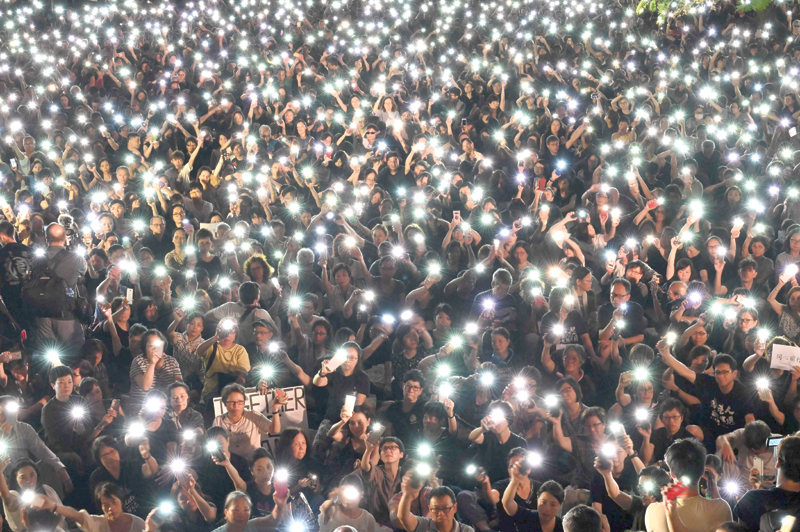

HONG KONG: A Hong Kong street artist was charged on Friday with assaulting a police officer and criminal damage, the first prosecution against an anti-government protester since the city was rocked by unprecedented demonstrations.
Sparked by a law that would have allowed extraditions to mainland China, the city has witnessed three huge peaceful rallies as well as civil disobedience and violence from a hard core of younger protesters who have besieged the police headquarters and on Monday stormed the city’s parliament.
Authorities have vowed to hunt those behind the unrest that has plunged the semi-autonomous city’s Beijing-backed government into crisis.
Pun Ho-chiu, 31, appeared in court on Friday over his alleged involvement in the blockade of the city’s police headquarters on June 21.
He was also charged with disorderly behaviour for throwing eggs at police outside the headquarters during the six-hour siege.
A well-known activist nicknamed “Painter” for his street art, Pun was remanded in custody and faces up to ten years in jail if convicted.
He was one of the only protesters during the police siege to show himself unmasked.
In court his lawyer said he was assaulted by police who spoke to him in Mandarin — the predominant language on the Chinese mainland.
The judge said the court could not investigate the claims and directed him to the police complaints procedure.
Forensic investigators have been combing through the trashed parliament for fingerprint and DNA evidence to help identify protesters who stormed the building and left its walls daubed with slogans such as “HK is not China” and a colonial-era flag pinned to the legislature’s podium.
An AFP tally shows at least 66 arrests have been announced by police since the protests began. But it is not clear how many of those people have been charged and police did not respond to requests for a breakdown.
The unrest presents the most severe challenge to Beijing and Hong Kong’s leaders since the city’s handover to China.
Critics say Beijing has ratcheted up control over the city in recent years, stamping down on dissidents and refusing calls for universal suffrage.
While the current protests were sparked by huge public opposition to the extradition bill they have since morphed into a broad anti-government movement.
On Friday evening thousands of Hong Kong mothers rallied at a park in the commercial district of Central in support of those who ransacked parliament.
Didi Cheng, who has a 25-year-old daughter, said the protesters who stormed the building “had no other choice”.
“After two mass rallies, the cold-blooded government had no response,” the 53-year-old said.
“I have to come out to show my support for the youngsters, to tell them I stand with them.”
City leader Carrie Lam has postponed the extradition legislation but has failed to quell public anger.
Protesters have demanded she withdraw the bill entirely, launch an independent inquiry into police use of tear gas and rubber bullets, and step down.
Chief secretary Matthew Chueng — Lam’s de facto deputy — held talks with pro-democracy lawmakers which he said were “constructive” but there was no suggestion of a breakthrough.
“My meeting with the pan-democrats just now was very useful in the sense that it’s the first time we’ve really had an opportunity to sit down and talk candidly and frankly over the issues,” he told reporters.
Since the parliament siege Beijing has vocally thrown its support behind Lam, calling on Hong Kong authorities to pursue all those involved in the ransacking.
Multiple university student groups have rejected a request by Lam’s administration for closed-door talks, saying they would only meet if the government granted an amnesty to those arrested and held the dialogue in public.
Activists have also circulated plans for a new protest on Sunday via the encrypted app Telegram which will take place in Kowloon — an area of the city popular with mainland Chinese tourists who are subject to heavily censored news across the border. — AFP
Oman Observer is now on the WhatsApp channel. Click here



